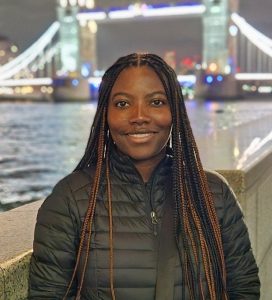Tracy Tabvuma
Mental Health Nurse Ambassador

Q: What are your goals for Equally Well? What inspires you about Equally Well?
A: I am inspired by Equally Well’s commitment to evidence-based, person-centred care and its ability to embrace intersectionality (recognition of how race, gender, socioeconomic status and lived experience intersect to shape health outcomes). I am keen to contribute to Equally Well’s mission to promote equitable access to all services by bringing a lens of intersectionality and cultural safety. My primary goal for Equally Well is to advance truly integrated care models that honour both physical and mental health, especially for ethnically and culturally diverse communities. I am also eager to promote solution-focused approaches to dismantling systemic biases in healthcare and co-designed services with consumers and carers.
Q: How do you see Equally Well benefiting carers/consumers/practitioners?
A: For consumers, Equally Well’s holistic and person-centred approach validates the mind and body connection, lived experience and fosters self-advocacy. Consumers and carers are provided with a clearer pathway to access integrated care e.g. regular physical health checks become routine as mental health reviews. Practitioners benefit from the practical tools such as the consensus statement, screening protocols and referral pathways to identify and manage physical health risks early.
Q: What hurdles do you currently see Equally Well facing and will have to face in the future? Is there a particular area you believe needs more focus that Equally Well can develop on?
A: A key hurdle that persists is the system fragmentation where mental and physical health services still operate in silos making holistic care difficult. This means physical and mental health services still operate under different budgets and KPIs which impede integrated care. Equally Well can focus on demonstrating cost-effectiveness through pilot programs showing that early physical health interventions reduce long-term hospitalisations and overall system costs.
Additionally, we must also tackle data invisibility, specifically the lack of disaggregated mental and physical health related data for Black, African and other priority populations. Invisibility precludes prevention efforts and tailored interventions. Equally Well could potentially address this issue by championing the routine collection and reporting of disaggregated health data across all the initiatives. This means building partnerships with relevant ethnically and culturally diverse organisations, community leaders from Black, African, and other priority populations at every step, from survey design through to data governance. Equally Well can also advocate for policy reforms requiring health services and research funders to report on outcomes by ethnicity and other social determinants. Addressing data invisibility benefits everyone by unlocking targeted prevention and intervention strategies, leading to more effective programs, better resource allocation and ultimately healthier communities.
Q: What have you personally learnt and has this knowledge impacted your life and/or the lives of those around you?
A: Through my work with Tabvuma Mental Health (a small, inclusive and culturally responsive mental health service) and in developing the Body Awareness workbook, I have come to deeply appreciate how restoring the body-mind connection can empower people experiencing mental distress. This work has shown me that when individuals learn to listen to their bodies, they often regain a sense of agency and control that is crucial for recovery and wellbeing.
Personally, this journey has made me more mindful of my own stress signals and resilience needs. I have incorporated practices like body scanning and regular wellbeing check-ins into my daily routine. Embracing the African philosophy of Ubuntu, the idea that “I am because we are,” I have encouraged those close to me, including family, friends, colleagues and clients to adopt similar practices. Informally, I have seen how these small shifts have nurtured a stronger connection with the body, created space for difficult conversations and reduced burnout in both personal and professional circles.
Q: As an Equally Well Ambassador, you are an advocate for improving the physical health of those who live with a mental illness, have there been any new developments or research in your area of interest?
A: Drawing on insights from my PhD exploring the role of the Physical Health Nurse Consultant (PHNC) in supporting people diagnosed with a mental illness (specifically psychosis) and from the perspectives of consumers, carers and health professionals, the findings highlighted the value of embedding this role into everyday clinical practice. Participants saw PHNC as uniquely positioned to integrate physical and mental healthcare in a person-centred way.
While this work has laid an important foundation, it also raised new questions especially around how we adapt these models in other settings and groups. There is great potential in exploring scalable innovations such as nurse-led and culturally responsive physical healthcare, digital health interventions or peer-led wellbeing programs. I approach this field with ongoing curiosity and humility to learn and collaborate with others.
Q: What do you see is your role for Equally Well as one of our ambassadors?
A: I see my role as both a connector and a cultural advocate. On one hand, I aim to champion the routine integration of physical health into mental health settings, including our work at Tabvuma Mental Health. On the other, I feel a responsibility to ensure that national strategies reflect the needs and strengths of communities often left out of mainstream narratives. That means amplifying the voices of Black, African, and other ethnically and culturally diverse people who experience significant disparities in access and outcomes. It also means advocating for data transparency, culturally relevant research and care models that respect identity, language and lived experience. I see my role as contributing to a more equitable and inclusive Equally Well.

